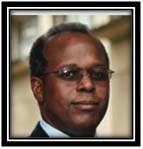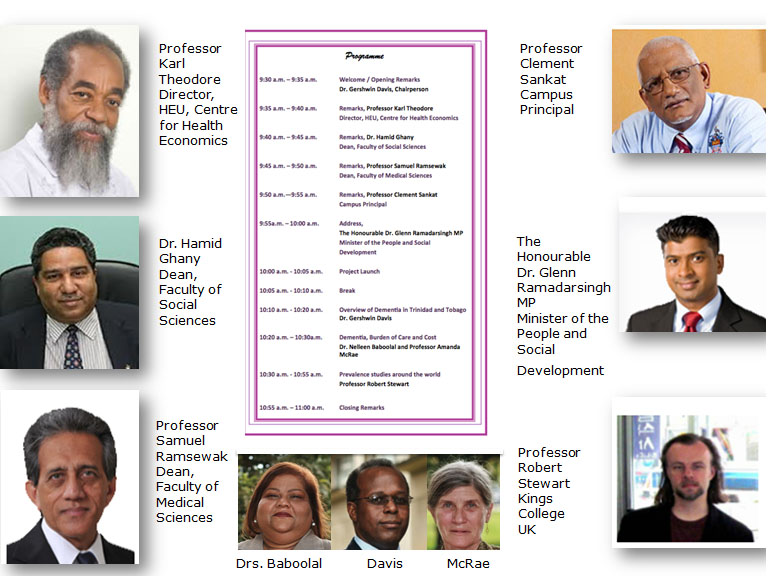LAUNCH OF THE PREVALENCE AND ECONOMIC COST OF DEMENTIA PROJECT IN TRINIDAD AND TOBAGO APRIL 2012
 The launch of the prevalence and economic cost of dementia project in Trinidad and Tobago was chaired by Dr. Gershwin Davis (picture above) who gave the opening remarks and a brief overview of what a prevalence study accomplishes and how the Trinidad and Tobago study will be conducted.
The launch of the prevalence and economic cost of dementia project in Trinidad and Tobago was chaired by Dr. Gershwin Davis (picture above) who gave the opening remarks and a brief overview of what a prevalence study accomplishes and how the Trinidad and Tobago study will be conducted.
DEFINITION OF A PREVALENCE SURVEY
A prevalence survey provides an estimate of the proportion of individuals within a defined population that have a health condition at one point in time. The proportion, called the prevalence, provides a snapshot of the health status of the community at the time that the survey is conducted. For dementia, this includes those who have recently developed the condition (incident cases) and those that have lived with the condition for some time (prevalent cases). The prevalence is therefore the product of the incidence rate and the average length of survival with the illness.
EXPECTED IMPACTS OF PREVALENCE OF DEMENTIA STUDY
- Accurate assessment of the numbers of cases within a region, country or district, thereby allowing governments, and health and welfare organizations to plan adequate services
- Identifying regional variations in the prevalence of dementia and its sub- types, allowing epidemiologists to develop and test theories about possible risk factors for the disease
- Describing the living circumstances, and care arrangements of people with dementia, including informal care (by family members) and use of health and social services
- Describing the impact of dementia at the population level including the economic costs
- Raising awareness about dementia.
PREVALENCE OF DEMENTIA and ITS ECONOMIC BURDEN IN TRINIDAD &TOBAGO
AIMS: Firstly this project will establish the prevalence of dementia in persons aged 60 and above throughout Trinidad and Tobago. Secondly, this study will determine the associated cost and implications for the family and caregivers, health care system and economy of Trinidad and Tobago.
The inclusion of the age range 60-65 will provide information on the likely prevalence of relatively early-onset dementia.
In accordance with the current concept of prevalence studies in addition to dementia diagnosis our investigations will generate information about the age, gender, education, amount of income, living circumstances, household assets, health conditions, possible risk factors associated with dementia, use of health facilities and social services, cost of dementia, and family care arrangements. Click on this link for more details of this Dementia Study.
PANEL OF SPEAKERS: LAUNCH OF THE PREVALENCE AND ECONOMIC COST OF DEMENTIA PROJECT IN TRINIDAD AND TOBAGO

SEE BELOW FOR THE HIGHLIGHTS OF REMARKS FROM :
- Professor Karl Theodore Director, HEU, Centre for Health Economics
- Dr. Hamid Ghany Dean, Faculty of Social Sciences
- Professor Samuel Ramsewak Dean, Faculty of Medical Sciences
- Professor Clement Sankat Campus Principal
The common thread from remarks of the above speakers was to congratulate the investigators for pursuing this extremely important project. It was recognized that Trinidad and Tobago was an ageing society and that a sound database about the prevalence of dementia and its cost was essential.
As this study is first of its kind in Trinidad and Tobago and it will allow our policy makers to comprehend both the current prevalence and impact of dementia. Secondly, and important. It will be the first such survey to adopt age-stratified sampling. The latter approach is feasible in Trinidad and Tobago because of the recent national census, which, provides the opportunity to sample within age ranges (something not possible for most countries) and is particularly valuable for a disorder such as dementia whose prevalence increases exponentially with age (approximately doubling with every 5 year increase in age after 65).
This aspect of our study will provide for demographic projections based on expected changes in the age structure of the underlying population. Therefore policy makers will have a valuable tool to plan for and predict the impact of dementia in the future. It will build awareness of the full cost of dementia (including some cost elements that may not have been as obvious to those not directly impacted by dementia).
This study will detail the needs of the individual and households affected by dementia with a view to enhancing the welfare and well-being of such individuals and households. The investigators were provided the assurance by the campus administrators that they had their full support. All of them express a sense of pride that this project was being conducted by Faculty members of The University of West Indies.
They emphasized that the deliverance of this project would be enhanced by pooling expertise from both the Faculty of Medical Sciences and the Faculty of Social Sciences through the Health Economics Unit. Not only was this significant for the research but it also strengthens camaraderie across the campus.
The Hon. Dr. Glenn Ramadarsingh MP Minister of the People and Social Development Gave the Address for the Launch
The Minister gave the commitment of his Ministry to this project and congratulated the investigators for undertaking this highly significant endeavor. He also said that he was looking forward to seeing the final report as it was very important to be aware of the prevalence and the cost of dementia in Trinidad and Tobago. This is particularly true as the Division of Ageing is an umbrella agency of His Ministry.
He emphasized that the Government of Trinidad and Tobago was committed to supporting the elderly and this had been shown through their endorsement of both the Brasilia Declaration and its predecessor the Madrid International Plan of Action on Ageing. He noted that new and innovative organizational structures would also have to be created within the Division [of Ageing] to promote healthy and active ageing among the older persons in particular.
He commented on the achievements of the Division of Ageing in particular the creation of senior centers. He commented that senior citizens will enjoy dancing, karate, meditation and other activities at the centres.
“These centres allow the seniors to be socially engaged and linked to needed services. It assists in alleviating risk of social isolation, which we know in turn puts our seniors at a higher level of vulnerability and marginalisation, especially when we consider other factors like deteriorating health and psychosocial well-being,”
He indicated that presently a National Plan of Ageing was currently being formulated by the Division of Ageing in collaboration with numerous other ministries and government agencies. The results from this Prevalence of dementia and its economic burden will be essential to guide policy makers as to how to cope with the demands that this disorder will impose on affected individuals, society, the health sector, and families.
He closed in reminding us that Senior citizens should no longer be treated as burdens, but rather as assets with skills and experience that can be used to build a sustainable Trinidad and Tobago.
Other distinguished attendees at the Launch included:
- Representative from the Ministry of Health
- Representative from the Ministry of Science, Technology and Tertiary Education
- Faculty from the University of the West Indies
- The president and other members of the Alzheimer’s Association of Trinidad and Tobago
TRAINING WORKSHOP FOR ENUMERATORS
To ensure that our interviews are conducted in a similar manner as those performed in the other countries, a training workshop for enumerators will follow this session. The 2 day work shop will be conducted by our guest speaker Professor Robert Stewart (Institute of Psychiatry, King’s College London) who is a founding member of the 10/66 dementia research group. See article on Training Workshop.
